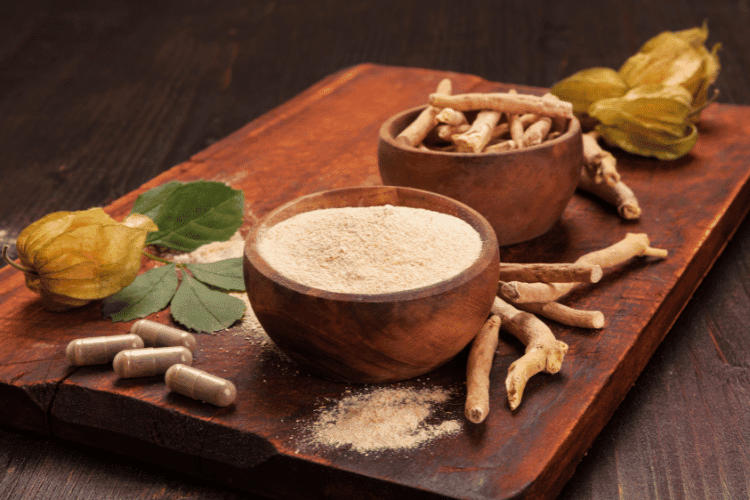In the world of natural healing, Ashwagandha emerges as a remarkable herb known for its balancing effects on overall well-being. However, could this ancient remedy hold the key to more restful sleep? What’s the deal with the alleged Ashwagandha lucid dreams anyway?
While the connection might not be immediately apparent, the science of sleep reveals an intriguing possibility: Ashwagandha’s potential to positively impact our sleep patterns and experiences.
In this article, we explore the connections between Ashwagandha and having vivid dreams. So, keep reading.
Ashwagandha, scientifically known as Withania somnifera, has earned a reputation as an adaptogenic herb with a rich history in traditional herbal medicine. Derived from Sanskrit, its name translates to “smell of a horse,” suggesting its ability to convey strength.
Primarily, the herb is famous for its adaptogenic properties, meaning it can help the body adapt to stressors and restore balance.
In both Ayurvedic medicine and modern holistic practices, Ashwagandha has found its place as a versatile remedy. In fact, many experts believe it promotes well-being by harmonizing bodily functions and supporting vital systems.

Basically, the plant’s nature allows it to modulate stress hormone levels, particularly cortisol. Such a hormone plays a central role in the body’s response to stress. By addressing stress and promoting balance, Ashwagandha can potentially influence how many hours of sleep you get.
In general, stress often takes a toll on sleep quality and overall mental health. That’s why people believe that the effects of Ashwagandha can extend to the realm of sleep and dreams.
Creating a foundation of internal equilibrium, Ashwagandha might indirectly set the stage for enhanced sleep experiences, potentially paving the way for more vivid dreams.
Furthermore, this adaptogen’s impact on neurotransmitters like GABA (gamma-aminobutyric acid) adds another layer to its sleep-supporting potential.
Mostly, GABA is known for its calming effects on the nervous system. That’s why Ashwagandha’s potential to enhance GABA activity might further aid in achieving a state of relaxation that’s essential for restful slumber.
Aside from its abilities to improve sleep and reduce anxiety levels, people also use Ashwagandha for a wide range of reasons, including:
Now that you know more about Ashwagandha’s adaptogenic properties, let’s zoom in on its potential to level up your snooze game.
In general, we all know the feeling of a restless night—tossing, turning, and greeting the dawn with a groggy sigh. That’s when Ashwagandha, your potential sleep superhero, comes in handy.
Research suggests that Ashwagandha might be a key player in the quest for a better night’s rest. Its stress-reducing powers can help create a calm environment for your body to wind down.
By taming cortisol levels, this adaptogen signals to your brain that it’s time to relax, helping you make a more peaceful transition into dreamland.
Yet, it doesn’t stop there. While you might think deep sleep translates to dreamless sleep. With Ashwagandha, it’s quite the opposite.
Ashwagandha’s sleep-boosting effects can influence the different sleep stages, including the all-important REM (rapid eye movement) stage—the sweet spot for dreams.
When your body gets ample REM sleep, the chances of experiencing more vivid dreams increase. It’s like Ashwagandha is whispering to your brain, “Hey, time for some awesome dreams!”
So, think of Ashwagandha as your bedtime buddy, creating a stress-free zone that sets the stage for deep, restorative sleep.

Diving deeper into the intricate dance between Ashwagandha and dreams, it’s essential to spotlight the REM sleep stage—the very heartbeat of dreamland.
Adequate REM sleep is vital for well-formed dreams, and disruptions in this stage can lead to fragmented and less memorable dream experiences.
Basically, during REM sleep, our brains become a theater of captivating scenarios, where dreams unfold with vivid colors and intricate plots.
That said, research indicates that Ashwagandha’s effect on sleep quality might extend to the REM stage.
While a complete understanding of how the plant interacts with the REM stage is still unfolding, the adaptogen’s impact on stress reduction and overall sleep improvement holds promise.
By fostering a conducive environment for high-quality sleep, Ashwagandha might indirectly contribute to more engaging dream narratives.
There’s a fascinating phenomenon known as lucid dreaming. In a lucid dream, you’re not just a passive observer – you become aware that you’re dreaming and can even take control of the dream’s direction.
Such an experience can open up a world of possibilities where you can do things you might never imagine in waking life.
Mainly, the cool thing about lucid dreams is that they’re like a playground for your mind. Through them, you can confront fears, test out scenarios, and explore your creativity without any real-world consequences.
However, this type of dreaming isn’t just about fun; it has practical benefits too. In fact, many people use lucid dreams to practice real-life skills, face their fears, and gain insights into their thoughts and emotions.
With our understanding of Ashwagandha’s influence on sleep deepening, it’s time to ponder whether the effects extend into the world of dreams. While direct scientific evidence is a work in progress, some puzzle pieces hint at intriguing possibilities.
As Ashwagandha fosters an environment of tranquility by taming stress and supporting relaxation, it might indirectly lead to immersive dream experiences.
In general, When stress levels are managed, the mind is less cluttered, offering a canvas for the subconscious to paint its narratives. Moreover, Ashwagandha’s potential to enhance the continuity of deep sleep might have a ripple effect on dream continuity as well.
Longer periods of uninterrupted sleep could mean more extended journeys through the different sleep stages, including the REM stage (where dreams come to life).
Overall, scientists are still piecing together the intricate mechanics of this relationship. Yet, to know the relationship between Ashwagandha’s adaptogenic properties, improved sleep quality, and the potential for more vivid dreams is captivating for many.

Like many, you might be curious about practical steps to unlock the potential of lucid dreaming. While there’s no magic formula, combining Ashwagandha with tried-and-true lucid dreaming techniques could set the stage for a more vivid and conscious dreaming experience.
Remember, while Ashwagandha might play a role in creating a conducive mental environment, honing your lucid dreaming techniques remains an essential component of this exciting journey into conscious dreaming.
Here are a few tips that can potentially help you experience lucid dreaming with Ashwagandha:
While the connection between Ashwagandha and dream enhancement is fascinating, it’s important to acknowledge the ongoing journey of scientific inquiry. Thus, dreams and their interaction with botanical substances like Ashwagandha remain a terrain to be further explored.
Basically, current understanding is based on anecdotal reports and preliminary research, leaving ample room for more comprehensive scientific investigations.
Therefore, establishing a concrete link between Ashwagandha’s adaptogenic qualities, sleep patterns, and dream experiences is still an essential matter to consider.
Ashwagandha stands as an intriguing candidate that beckons us to explore beyond the ordinary. While our understanding is a blend of ancient wisdom and modern science, the journey is far from over.
As we await more definitive scientific revelations, the reasons for Ashwagandha lucid dreams continue to kindle curiosity. So, whether you’re a dream enthusiast or an explorer of the unknown, don’t give up on exploring the limits of such a fascinating plant.
Having said that, it’s important to note that individual responses to ashwagandha can vary. Therefore, before incorporating Ashwagandha into your routine, you should consult with your physician, especially if you have underlying health conditions or are taking medications.